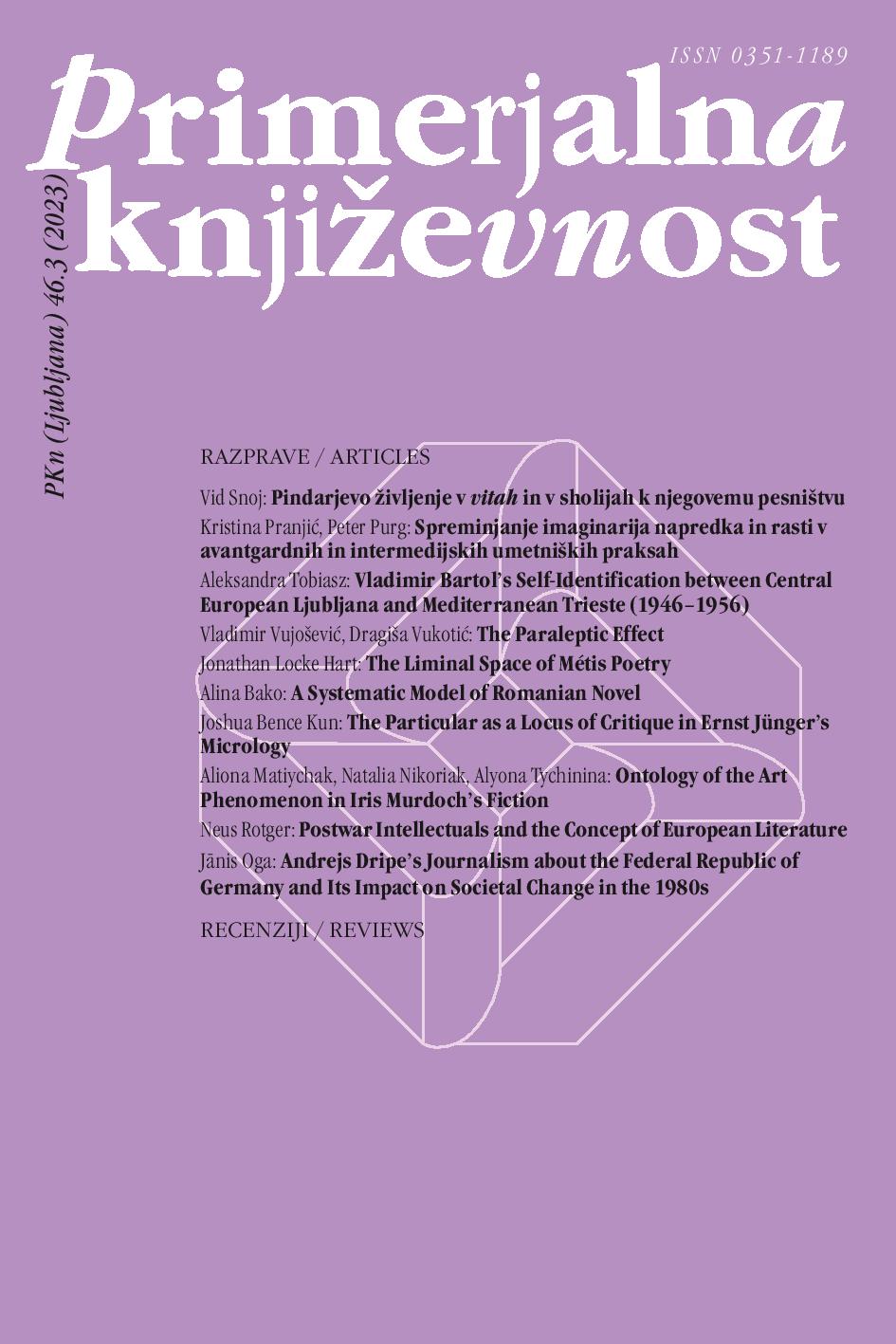The Particular as a Locus of Critique in Ernst Jünger’s Micrology
DOI:
https://doi.org/10.3986/pkn.v46.i3.07Keywords:
philosophy, Jünger, Ernst, social critique, Platonism, insect, micrologyAbstract
In this article I examine the micrological method developed by Ernst Jünger in The Adventurous Heart and later writings. I understand micrology as a philosophical-literary approach to describing individual objects that shed light on the broader context in which they are situated, especially insofar as this context resists conventional discursive practices. First, I argue that, contrary to popular belief, Jünger’s metaphysical presuppositions are not at odds with the social insights he arrives at in his micrological works. In doing so, I will show that some of Jünger’s illustrations have considerable socio-historical significance. I then propose that there is substantial correspondence between Jünger’s entomological and micrological perspectives, in part because they both rely on locating unlikely traces of difference in a seemingly ordinary or uniform setting. Given the relative lack of scholarship on the structure of micrological enquiry, particularly in relation to Jünger’s fragments, addressing these problems requires a more detailed account of the formal qualities of a micrological model.
References
Adorno, Theodor W. Prisms. Transl. Samuel and Shierry Weber. Cambridge, MA: The MIT Press, 1983.
Benjamin, Walter. The Arcades Project. Transl. Howard Eiland and Kevin McLaughlin. Cambridge, MA: Harvard University Press, 2002.
Benjamin, Walter. The Work of Art in the Age of Its Technological Reproducibility, and Other Writings on Media. Transl. Edmund Jephcott et al. Ed. Michael W. Jennings, Brigid Doherty, and Thomas Y. Levin. Cambridge, MA: Harvard University Press, 2008.
Bennett, Jane. Vibrant Matter: A Political Ecology of Things. Durham, NC: Duke University Press, 2010.
Bloch, Ernst. Traces. Transl. Anthony A. Nassar. Stanford, CA: Stanford University Press, 2006.
Blok, Vincent. Ernst Jünger’s Philosophy of Technology. New York, NY: Routledge, 2017.
Brown, Bill. “Thing Theory.” Critical Inquiry 28.1 (2001): 1–22.
Bullock, Marcus. “Walter Benjamin and Ernst Jünger: Destructive Affinities.” German Studies Review 21.3 (1998): 563–581.
Bullock, Marcus. The Violent Eye: Ernst Jünger’s Visions and Revisions on the European Right. Detroit, MI: Wayne State University Press, 1992.
Bures, Eliah, and Elliot Neaman. “Introduction.” Ernst Jünger. The Adventurous Heart: Figures and Capriccios. Transl. Russell A. Berman. Candor, NY: Telos Press, 2012. 7–44.
Cook, Laurence, and Ilik Saccheri. “The Peppered Moth and Industrial Melanism: Evolution of a Natural Selection Case Study.” Heredity 110.3 (2013): 207–212.
Eiland, Howard. “Translator’s Foreword.” Walter Benjamin. The Arcades Project. Cambridge, MA: Harvard University Press, 2002. Ix–xiv.
Freyenhagen, Fabian. “What Is Orthodox Critical Theory?” World Picture 12 (2017): 1–11.
Giuriato, Davide. Mikrographien: zu einer Poetologie des Schreibens in Walter Benjamins Kindheitserinnerungen (1932–1939). Paderborn: Fink, 2006.
Goethe, Johann Wolfgang von. “Excerpt from ‘Studies for a Physiology of Plants’.” Scientific Studies. Ed. and transl. Douglas A. Miller. New York, NY: Suhrkamp, 1988. 73–75.
Gorenstein, Dan. “Ants and Battlefields, Beetles and Landscapes: Rudiments for a Naturalistic Reading of Ernst Jünger’s Interwar Essays through the Lens of His Later Entomological Hermeneutics.” Texts, Animals, Environments: Zoopoetics and Ecopoetics. Eds. Frederike Middelhoff et al. Freiburg: Rombach, 2019. 201–215.
Gruyer, Michael F. Animal Micrology: Practical Exercises in Microscopical Methods. Chicago, IL: The University of Chicago Press, 1906.
Harman, Graham. “I Am Also of the Opinion That Materialism Must Be Destroyed.” Environment and Planning D: Society and Space 28.5 (2010): 772–790.
Helmling, Steven. “Constellation and Critique: Adorno’s Constellation, Benjamin’s Dialectical Image.” Postmodern Culture 14.1 (2003): 1–27.
Hohendahl, Peter. “The Future as Past: Ernst Jünger’s Postwar Narrative Prose.” The Germanic Review 88.3 (2013): 248–259.
Huyssen, Andreas. “Fortifying the Heart—Totally: Ernst Jünger’s Armored Texts.” New German Critique 59 (1993): 3–23.
Jennings, Michael W. “Introduction.” Walter Benjamin. One-Way Street. Cambridge, MA: Harvard University Press, 2016. 1–20.
Jünger, Ernst. “Siebzig verweht V.” Sämtliche Werke. Vol. 7. Stuttgart: Klett-Cotta, 2003.
Jünger, Ernst. Approaches: Drugs and Altered States. Transl. Thomas Friese. Candor, NY: Telos Press, 2022.
Jünger, Ernst. Das Abenteuerliche Herz. Stuttgart: Klett-Cotta, 2015.
Jünger, Ernst. “Sizilischer Brief an den Mann im Mond”. Sämtliche Werke. Vol. 9. Stuttgart: Klett-Cotta, 1981. 9–27.
Jünger, Ernst. Strahlungen. Tübingen: Heliopolis Verlag, 1949.
Jünger, Ernst. Subtile Jagden. Stuttgart: Ernst Klett, 1967.
Jünger, Ernst. The Adventurous Heart: Figures and Capriccios. Transl. Russell A. Berman. Candor, NY: Telos Press, 2012.
Jünger, Ernst. The Worker. Ed. Laurence Paul Hemming. Transl. Bogdan Costea. Evanston, IL: Northwestern University Press, 2017.
Kirst, Karoline. “Walter Benjamin’s ‘Denkbild’: Emblematic Historiography of the Recent Past.” Monatshefte 86.4 (1994): 514–524.
Kracauer, Siegfried. The Mass Ornament: Weimar Essays. Cambridge, MA: Harvard University Press, 1995.
Marcus, Greil. “Preface.” Walter Benjamin. One-Way Street. Cambridge, MA: Harvard University Press, 2016. ix–xxv.
Neaman, Elliot. “Foreword.” Ernst Jünger. A German Officer in Occupied Paris: The War Journals, 1941–1945. New York, NY: Columbia University Press, 2019.
Novalis. Notes for a Romantic Encyclopaedia: Das Allgemeine Brouillon. Transl. David W. Wood. Albany, NY: State University of New York Press, 2007.
Ohana, David. “Nietzsche and Ernst Jünger: From Nihilism to Totalitarianism.” History of European Ideas 11.1–6 (1989): 751–758.
Peters, H. F. “Ernst Jünger’s Concern with E. A. Poe.” Comparative Literature 10.2 (1958): 144–149.
Richter, Gerhard. Thought-Images: Frankfurt School Writers’ Reflections from Damaged Life. Stanford, CA: Stanford University Press, 2007.
Schopenhauer, Arthur. The World as Will and Representation, Vol. I. Transl. E. F. J. Payne. New York, NY: Dover, 1969.
Schumacher, Ernst Fritz. Small Is Beautiful: Economics as If People Mattered. London: Blond & Briggs, 1973.
Steiner, George. “The Zero at the Bone.” Encounter 35 (1970): 72–76.
Strathausen, Carsten. “The Return of the Gaze: Stereoscopic Vision in Jünger and Benjamin.” New German Critique 80 (2000): 125–148.
Weissberg, Liliane. “Philosophy and the Fairy Tale: Ernst Bloch as Narrator.” New German Critique 55 (1992): 21–44.


